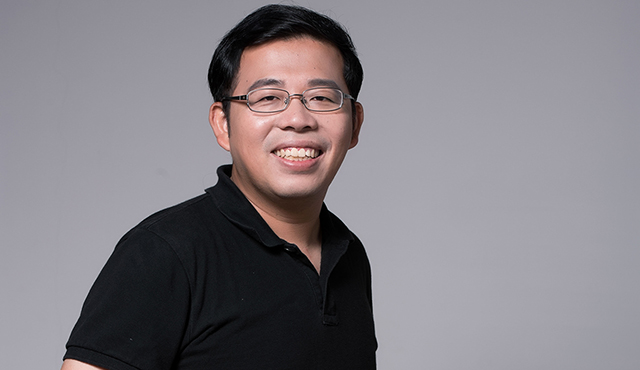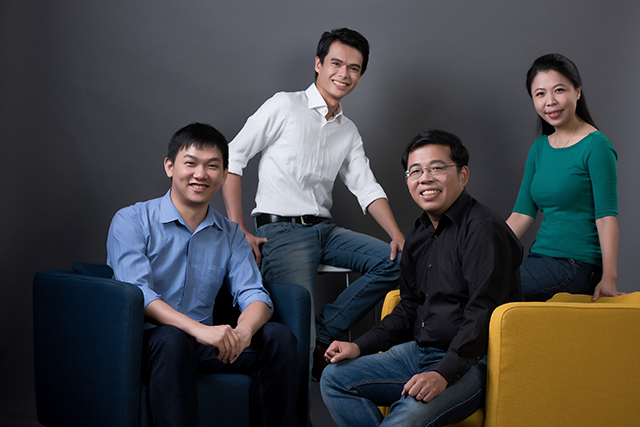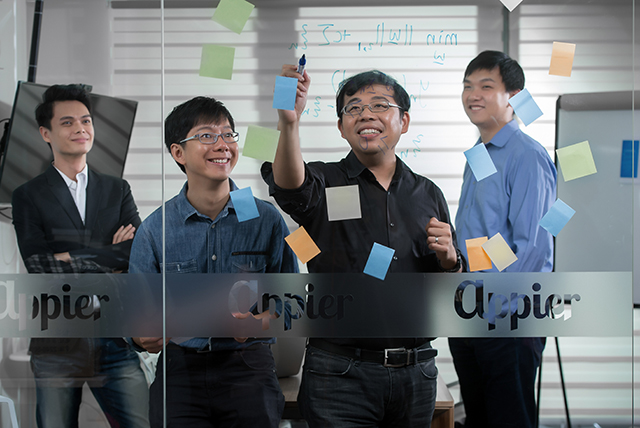Data Science 1 video
Using artificial intelligence to help businesses make smarter decisions
As founder and CEO of Appier, a company that uses artificial intelligence to help businesses solve problems, Chih-Han Yu, Ph.D. ’10, is immersed in the latest technological trends.
But for Yu, who knew nothing about computers during his youth in Taiwan, the journey to becoming a tech-savvy innovator was nearly derailed before it began.
While he decided to follow his father’s advice and study computer science in college, he didn’t enjoy the classes and nearly abandoned the field completely. It wasn’t until his junior year, when he took an artificial intelligence class, that Yu became captivated by the seemingly endless potential of computers.
His desire to build a program to recognize human faces soon bordered on an obsession, he said.
“In a way, I almost became a different person. In order to build a great system, I had to learn a lot of things—statistics, math, numerical methods, and how to code,” he said. “That was really the point in time when I started to feel like I had found something I was very interested in.”

He started working as a research assistant, spending much of his free time reading computer science journal articles and absorbing all he could about the latest advances.
His desire to learn more led him to Stanford, where he enrolled in a master’s program and conducted research in the university’s artificial intelligence lab. He studied AI applications for robotics control, designing systems that could recognize stairs or obstacles on the ground.
He had a plan to pursue a computer science Ph.D., and when his girlfriend moved to Boston to work on her genetics research startup, Yu followed. He settled on the Harvard John A. Paulson School of Engineering and Applied Sciences, and joined the lab of Radhika Nagpal, Fred Kavli Professor of Computer Science, inspired by the potential of decentralized biological theories in AI applications.
There, Yu and his lab mates used these principles to make computational systems faster and more efficient.
“A lot of times, in AI research, you deal with algorithms that already have a mathematical foundation, but initially we had little theoretical framework for our work. We had to create one,” he said. “We didn’t have the robotics hardware, so we had to create that, too. We were working on the full spectrum—from the theoretical foundation to the robotic fabrication, all the nuts and bolts.”
An academic research career appealed to Yu, but one of his roommates convinced him to give entrepreneurship a try. Joe Su, now Appier’s CTO, was interested in using the latest AI research for real-world applications, so the two joined forces to launch a startup, Plaxie.
Working out of a tiny apartment, they developed an artificial intelligence game engine that could learn how people play games, and then generate AI characters that behave like human players.
“The biggest challenge for us was finding the right business model. Coming from academia, we had a different experience of how to commercialize something,” he said. “We couldn’t sell it.”
Every game publisher they approached turned them down. Finally, one publisher made them an offer: since they had been so persistent, perhaps they could help the company in another way.
“They gave us a bunch of game data and we tried to predict for each user what kind of game this user would be interested in playing, so they could cross-promote their titles,” he said. “We developed some algorithms and the results were great. Here we had been on the market for three years trying to sell a product no one wanted to buy, when all we had to do was apply the skills we had to generate business impact.”
That success convinced the entrepreneurs to pivot—they renamed the company Appier and focused on using machine learning to harness data and help solve business problems.

Today, Appier offers several business-to-business products . One tool uses machine learning to help businesses acquire high-quality customers in the digital world. Another product incorporates AI to automate the way apps and websites communicate with customers. The company also develops solutions to help customers automate the process of building a data pipeline.
The firm has grown rapidly. With more than 400 employees, it now operates in 15 cities throughout Asia. Fortune Magazine recently named Appier one of the top 50 AI companies in the world.
“There is no shortcut and no trick to success. We keep learning everyday,” Yu said. “One of the challenges I face, as we have grown bigger, is maximizing my ability to align everyone’s direction going forward. In that small apartment, it was easy to get everyone’s consensus—we worked at the same desk. Now, we have to work harder to maintain an open culture.”
For Yu, one of the best parts of the job is the opportunity to learn new things. The company incorporates cutting edge AI and deep learning into every aspect of its products, so staying ahead of the pack is paramount to Appier’s success.
Looking to the future, he is excited to explore other business functions Appier can target to help customers make more precise decisions or minimize unnecessary waste.
Yu finds the prospect of exploring new technologies exciting, but experience has taught him that it takes more than science to be successful in business.
“Everybody has great ideas, but those who can communicate well can achieve eventual success,” he said. “When you are able to communicate your idea, and if you have persistence, a lot of things can come through to reality. Your impossible goal can be achieved.”

Do you have an interesting story you'd like to share with your fellow alumni? We'd love to hear from you! Contact the SEAS Office of Communications.